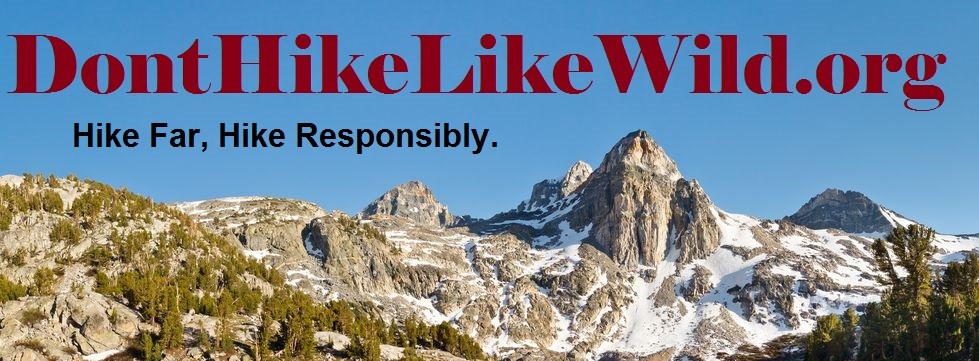The topic of the book and movie WILD invariably raises two very different types of responses. Many readers adore Cheryl Strayed for her honesty and vulnerability. They often speak of identifying with Strayed’s personal struggles, and even relate how her story reminds them of their own past.
Others are a little more disapproving Strayed’s eyebrow-raising antics. Rather than a pillar of feminine strength, many readers see Strayed as not only unprepared, but deliberately irresponsible. Often it seems that it is those with more hiking experience who point out that both on the trail, and during the period leading up to her hike, she never seemed to take responsibility for her own behavior.
With the response to WILD being decidedly mixed, Cheryl Strayed is understandably making an effort to defend herself and her story. In an interview published in Mother Jones around the time of the release of the movie, Strayed discusses the reaction to WILD in the thru-hiker community.
Mother Jones: The people who get rescued from wilderness areas often turn out to have been ill-prepared. Do you worry that some people might take your book too literally and set off on a three-month hike with little preparation?
Strayed: If you want to read anything nasty about me, just go to the backpacker websites. I mean, lots of outdoor people love Wild, but there’s this kind of elitist branch where they really believe that I had no business going backpacking. I get blamed: “Oh, Cheryl Strayed, it’s her fault if somebody needs to be rescued.” First of all, things have gone awry in the wilderness well before Wild was ever published. [Laughs.] But I actually don’t have any fear of people reading Wild and going out unprepared. Because one of the best things that ever happened to me was that I went out unprepared. And when you really think about it, all I did wrong was that I took too much stuff, which is the most common backpacker mistake. The part that I wasn’t prepared for is the part you can’t prepare for. You can’t replicate walking 94 days through the wilderness by yourself with a really heavy pack until you do it. I had to learn how to do a lot of stuff on the trail, that’s true. But I was the one who suffered the consequences.
Let’s take a closer look at these comments in the context of responsibility in the outdoors.
“…there’s this kind of elitist branch where they really believe that I had no business going backpacking.”
On the contrary, the great outdoors are indeed available for anyone willing to step off the road and into the woods. However the responsibility to protect these natural places is also shared by all. When a user negatively impacts the wilderness due to lack of experience, it is the duty of others to address it. WILD gives us all a national platform to launch a discussion of leave-no-trace ethics.
“Because one of the best things that ever happened to me was that I went out unprepared. And when you really think about it, all I did wrong was that I took too much stuff, which is the most common backpacker mistake.”
The very first principle of leave-no-trace ethics is that outdoors users should plan ahead and prepare. Because when they don’t, they often impact the environment in ways they can’t even see. Consider the rookie hunter who gets lost and starts a forest fire to attract rescuers as an extreme example. So even though she didn’t start any forest fires, Strayed did leave the trail in the first week to seek help from strangers when all of her untested gear failed.
Imposing on others is just one impact unexperienced hikers can have on the trail environment. Improper disposal of human waste, unnecessary scarring from fire pits, litter from abandoned gear are all examples of preventable harms that can be solved with a little preparation. Sorry Cheryl, but It is clear from your story that the consequences for your actions went beyond yourself. What other transgressions may have occurred that were not detailed in the book, that perhaps Strayed never even noticed as having an impact on those around her?
“The part that I wasn’t prepared for is the part you can’t prepare for. You can’t replicate walking 94 days through the wilderness by yourself with a really heavy pack until you do it. I had to learn how to do a lot of stuff on the trail, that’s true. But I was the one who suffered the consequences.”
No Cheryl, there are ways hikers can prepare for a long distance hike. How about taking a few shorter practice trips before embarking on a multi-month trek? Again, few inexperienced hikers are even aware of their impact on their surroundings. It is clear that even 20 years later, Stayed wants to turn a blind eye toward her responsibilities to the environment.
Taking Responsibility in the Outdoors
More recently Strayed has refined the point that the wilderness is for everyone. On her Facebook page Strayed posted the following comment.
Might I say, for the record, that while I made comic (and truthful) hay in WILD about all I needed to learn about backpacking (which was MUCH), the extent to which I was unprepared has been wildly overstated? Raise your hand if the first time you went backpacking you did a few things wrong (like take too much stuff, get blisters because your shoes weren’t quite right, underestimate the rigors of the endeavor, fail to know the exact way every single piece of your gear worked, understand precisely how to use a compass and read a topographical map). To me, this is the beauty of backpacking or any sort of venturing into the wild. It gives you the opportunity to learn lessons the hard way–in the way we don’t ever forget, in a manner that spills over into other areas of our lives. I’m not suggesting you go out there and be a reckless idiot, but neither will I ever endorse the idea that you need to earn a certificate in wilderness mastery before you take a walk in the woods. Just go. Take chances. Learn along the way. Like Thoreau did. And John Muir. And every other dude we revere for having written about his profound experience in the wild. Don’t buy into the idea that our national scenic trails belong to the self-anointed few.
…People like to write that I knew nothing about hiking before I set foot on the PCT, but as I wrote in my book, I was an avid day hiker before my PCT trek–a fact that often gets overlooked for reasons I do not understand. I’ve always loved to hike and I always will. …So, aside from in the most superficial ways, I don’t actually agree that I was terribly unprepared for my PCT hike and it seems to me that it’s about time I come out and say it here, on this only megaphone that belongs to me. If you read WILD carefully, you know that when I went to the PCT I was going home. And no matter where you came from or what your past was like or who you are or who others assume you to be, you get to go there too. You get to find a home in this wild and beautiful world. It belongs to you.
We couldn’t agree more that the great outdoors should be available to everyone. After all, the more people that get outside, the more people will hopefully work to protect it. However we draw the line when a user has a negative impact on the environment, or on other users of the outdoors.
Indeed most experienced thru-hikers can attest to making some of the very same mistakes that she made. The difference is that they learned from those mistakes and took responsibility for their future actions, rather than muddle on in deliberate helplessness. And this is where Strayed misses an important opportunity. She could have used WILD as a venue to promote responsible and conscientious use of our scenic lands. Instead she plays up her haplessness for sympathy points and sensationalism.
While the WILD phenomenon has certainly increased the chatter about hiking and long-distance trails, our hope is that readers will be able to resist the idea of ‘responsible only to myself’ thinking that Strayed is promoting, and instead learn from her mistakes on the trail. WILD can be a vehicle to raise the level of discussion about our personal responsibility in the woods. We only ask for Strayed to acknowledge that responsibility.

